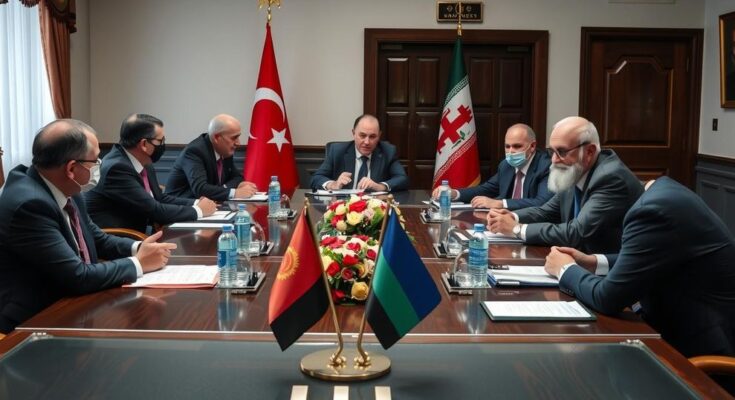Iranian Foreign Minister Abbas Araghchi met with his Iraqi and Syrian counterparts in Baghdad to discuss the Syrian crisis, following significant territorial gains by rebel forces. The meeting aims to formulate a joint response to the escalating conflict, amidst concerns about regional stability and security in Iraq, which is closely tied to developments in Syria. Internal divisions in Iraq regarding intervention and support for the Syrian regime reveal the complexity of the situation.
On Friday, Iranian Foreign Minister Abbas Araghchi arrived in Baghdad to engage in a crucial meeting with his Iraqi and Syrian counterparts. This tri-nation conference convened to address the escalating conflict in Syria, where rebel groups have recently made significant territorial gains. Following intense fighting, the Syrian opposition, spearheaded by the Islamist group Hayat Tahrir al-Sham (HTS), captured the vital city of Hama just days ago, inflicting unexpected losses on the Syrian government forces and their allies, including Iran and Russia.
The meeting, held with the aim of reaching a unified response to the Syrian crisis, follows alarming developments on the ground that prompted Iraq to express deep concern over national security and regional stability. Iraqi Foreign Minister Fuad Hussein emphasized the potential ramifications of these events, stating that such instability poses direct threats to Iraq’s security. Meanwhile, behind-the-scenes sentiments within the Iraqi leadership indicate skepticism regarding the effectiveness of coalition responses to the ongoing rebel onslaught. An unidentified Iraqi foreign ministry official articulated that the momentum gained by opposition forces may be irreversible, complicating any potential restoration of balance in favor of the Assad regime.
As the Syrian regime continues to reassess its tactics following the substantial rebel advances, indications of a possible counter-offensive have emerged. However, internal disagreements in Iraq regarding intervention in Syria have become increasingly prominent, with influential figures advocating for non-involvement. Khamis Al-Khanjar, a significant Sunni leader, and Shia cleric Muqtada Al-Sadr have both cautioned against the deployment of Iraqi forces in support of the Syrian government, underlining the importance of respecting the autonomy of the Syrian populace.
Contrarily, Falih al-Fayyadh, head of the Popular Mobilisation Forces, asserted the necessity for Iraqi vigilance amidst the turmoil in Syria, citing threats posed by terrorist groups. He underscored Iraq’s obligation to protect its national interests, given the interconnected nature of regional stability, illustrating the complexities and divisions present within Iraq’s political landscape regarding the Syrian conflict.
The situation in Syria has been characterized by ongoing violence since the outbreak of civil war over ten years ago. Recent offensives by rebel groups, including HTS, have complicated the previously established lines of control, leading to significant territorial losses for the Assad regime. The response of regional actors such as Iraq and Iran is crucial, as developments in Syria directly impact the stability of the broader Middle East. Iraq’s internal political dynamics, specifically among Shia and Sunni factions, further influence its approach to the conflict and its implications for national security.
In conclusion, the emergency meeting among Iraq, Iran, and Syria underscores the urgent need to address the escalating crisis in Syria. The recent advances by rebel forces, particularly HTS, have created significant challenges for the Assad regime, prompting concerns from Iraq regarding regional security. The divergent opinions within Iraqi leadership on whether to intervene in Syria reflect the complex and multifaceted nature of Middle Eastern geopolitics, emphasizing the importance of diplomatic engagement amidst rising tensions.
Original Source: www.newarab.com




